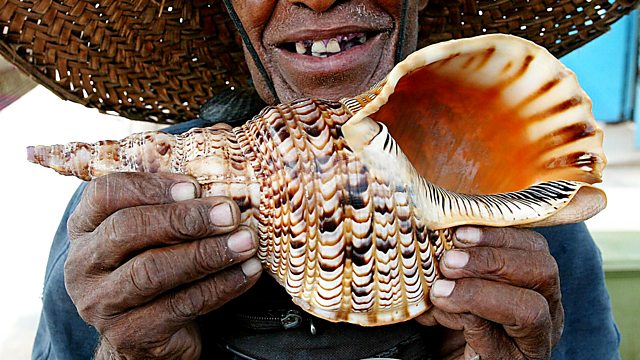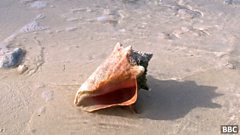Shells
What shells can tell us about our past, present and future. With marine scientist Anne Cohen, archaeologist Josephine Joordens and cultural historian Toby Green.
Mankind has long been attracted to beautiful shells, but what are the many other secrets that link them to our human fate? Bridget Kendall asks the marine scientist Anne Cohen, the archaeologist Josephine Joordens and the cultural historian Toby Green to share their thoughts.
(Photo: A man holds a conch shell. Credit: AFP/Getty Images)
Last on
Clip
-
![]()
A feisty shellfish
Duration: 00:40
Chapters
-
Anne Cohen
Shells and ocean acidification
Duration: 10:42
Josephine Joordens
The role of shells in human evolution
Duration: 09:18
60 Second Idea:
Eat Japanese oysters
Duration: 05:27
Toby Green
Shells used as money in West Africa
Duration: 11:54
Anne Cohen
![Anne Cohen]() Anne Cohen is a South African marine scientist based at Woods Hole Oceanographic Institute in Massachusetts. Her research focuses on the impact of ocean acidification on shells, and how the added CO2 has affected shells ability to calcify and therefore develop to adulthood. She says the problem has become so severe on the West coast of the US that they have already moved many oyster hatcheries to Hawaii. She is also looking at how food supplies could help molluscs counter the effects of ocean acidification.
Anne Cohen is a South African marine scientist based at Woods Hole Oceanographic Institute in Massachusetts. Her research focuses on the impact of ocean acidification on shells, and how the added CO2 has affected shells ability to calcify and therefore develop to adulthood. She says the problem has become so severe on the West coast of the US that they have already moved many oyster hatcheries to Hawaii. She is also looking at how food supplies could help molluscs counter the effects of ocean acidification.Josephine Joordens
![Josephine Joordens]() Dr Josephine Joordens is a Dutch archaeologist from the University of Leiden in the Netherlands whose studies of shell remains have revealed surprising new evidence about human evolution, especially early Homo. Much of her research is based in Indonesia and Kenya, and as well as discovering what kind of shells these early humans ate and how it affected their brain size and development, her team has also found one of the earliest forms of abstract art engraved on a shell. Josephine argues that while much research on early humans has focused on stone cultures, the importance of shells in our evolution has been underestimated.
Dr Josephine Joordens is a Dutch archaeologist from the University of Leiden in the Netherlands whose studies of shell remains have revealed surprising new evidence about human evolution, especially early Homo. Much of her research is based in Indonesia and Kenya, and as well as discovering what kind of shells these early humans ate and how it affected their brain size and development, her team has also found one of the earliest forms of abstract art engraved on a shell. Josephine argues that while much research on early humans has focused on stone cultures, the importance of shells in our evolution has been underestimated.Toby Green
![Toby Green]() Dr Toby Green is a British author and travel writer, and lecturer in Lusophone African History and Culture at Kings College London. He will be sharing with us his latest research on shells in pre-colonial West Africa, which were a major form of currency from as early as the 14th century. Toby explains how the Portuguese took advantage of the shell currency to cause hyper-inflation, and how the use of this currency was then responsible for the economic under-development of many African countries. His forthcoming book is – due to be published in 2017 is A Fistful of Shells: West Africans and Their Kingdoms during the slave trade era.
Dr Toby Green is a British author and travel writer, and lecturer in Lusophone African History and Culture at Kings College London. He will be sharing with us his latest research on shells in pre-colonial West Africa, which were a major form of currency from as early as the 14th century. Toby explains how the Portuguese took advantage of the shell currency to cause hyper-inflation, and how the use of this currency was then responsible for the economic under-development of many African countries. His forthcoming book is – due to be published in 2017 is A Fistful of Shells: West Africans and Their Kingdoms during the slave trade era.60 second Idea to Change the World: Eat Japanese oysters
![60 second Idea to Change the World: Eat Japanese oysters]()
In our Sixty Second Idea to improve the world, archaeologist Josephine Joordens suggests that we should eat unwanted animals or pests. Like for instance, the Japanese oyster that has been invading Europe and pushing out endemic species. She believes the best way to deal with this problem is to harvest the Japanese oysters and eat them – and also they’re much cheaper than the oysters we generally get in restaurants.
Broadcasts
- Mon 22 Jun 2015 01:05GMT����ý World Service Online
- Tue 23 Jun 2015 08:05GMT����ý World Service Online
Podcast
-
![]()
The Forum
The programme that explains the present by exploring the past







